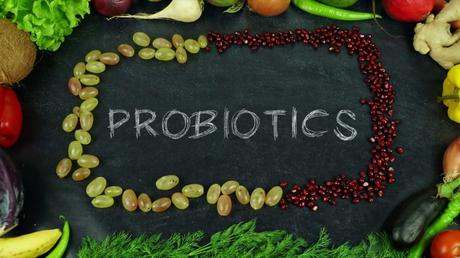This post may contain affiliate links. Please read my disclosure.
If your baby is uncomfortable and experiencing constipation, using a probiotic may help relieve their discomfort. In this parent friendly post, I review what exactly probiotics are, how to know if your baby is experiencing constipation, and provide you with a list of my 10 favorite probiotics for baby constipation!
When you're a parent, you closely monitor the ups and downs of your baby. How many hours are they sleeping through the night? How long are their naps during the day? How much they are eating during their feeds? Are they growing well?
So when you're baby is constipated, it can be super stressful! You are probably in tune with your baby's discomfort, and you want to alleviate it as soon as possible!
Remedies for Baby Constipation
There are several remedies you can use to help your baby relieve their constipation.
- If breast fed, change mom's diet to remove any potential allergens.
- If formula fed, change formula.
- If eating solids, try giving your baby high fiber foods such as broccoli, pears, prunes, peaches, skinless apples.
- Offer high fiber cooked grains, such as oats, barley, and quinoa.
- Increase the amount of fluids you give to your child. Often lack of fluids is the cause for constipation.
- Give baby exercise. If walking, take baby out for a walk. If not, move their legs with a bicycle motion.
- Gently massage baby's tummy several times a day.
Do Probiotics For Baby Constipation Work?
If you've tried the above changes, and still your baby experiences constipation, you may want to consider giving your child a probiotic.
Babies may have an imbalance in their gut bacteria that affects their GI tract. This in turn can cause constipation. Taking a probiotic for infants can reduce the onset of GI conditions, thus reducing the risk for constipation and acid reflux.
What Are Probiotics Exactly?
Probiotics are the good bacteria that naturally occurs in your body. You have both good and bad bacteria. When you get an infection, there is more bad bacteria than good bacteria. By taking a probiotic you add more of the good bacteria to your system to help bring the balance back to normal.
While we usually think of bacteria as bad, our bodies need the good kind of bacteria that is made up of a combination of yeasts and beneficial bacteria. By adding the good bacteria your body needs you can help fight infection.
Probiotics help your microbiome. We each have our own microbiome that is unique to us. Your microbiome is made up of organisms that work together to keep your body running and healthy.
Some of the microbes you have in your body include:
Microbes are a probiotic if they can be isolated from a human, survive in your intestine after ingestion, benefit you, and can be consumed safely. The most common place from beneficial microbes are in your gut.
The main job of probiotics is to help maintain a healthy balance of bacteria in your gut.
Are there any side effects associated with using probiotics for baby constipation?
In general, probiotics that are formulated for infants and babies have no side effects. In some cases infants can experience an allergic reaction, stomach pain, diarrhea, gas, and bloating.
Are probiotics safe for infants?
In most cases, probiotics have been shown to be safe for most healthy infants. However, at this time, there has not been very much research regarding the safety and effectiveness of probiotics in infants. Make sure to discuss the use of probiotics for your infant with your pediatrician prior to using them.
There are many different strains of probiotics, so you want to be sure to administer the best strain for your child. At this time there is no specific recommended dose for infants.
Can probiotics make constipation worse in infants?
While not a common reaction, it is possible that some yeast-based probiotics can cause increased constipation and thirst. The most common reaction to bacteria-based probiotics is an increase in gas and bloating.

What Is Constipation?
Constipation in infants and children is common. Over the course of your child's life, their bowel movements will change. Constipation occurs when your child's bowel movements get backed up. It's not only characterized by the infrequency of bowel movements, but also the consistency of your baby's stool. Hard stools are a sign of constipation.
There are many different causes of constipation. Some are behavioral, while others are environmental.
If your child is trying out new foods, this could be a cause for constipation. Babies are not the same when it comes to their bowel movements. So don't compare your child to others.
Breastfed babies may not have a bowl movement everyday. Formula fed babies may have three to four bowel movements a day.
Bowel movements are affected by the type of milk, new foods introduced, and will vary greatly from one child to the other.
What is acute constipation?
Acute constipation comes on suddenly. It can last for several days, or even a week and then resolves (usually with help from dietary changes).
What is chronic constipation in infants?
Chronic constipation is ongoing and keeps recurring.
How Can You Tell If Your Baby Is Constipated?
Your baby will give you clues to let you know he/she is constipated. Be observant of changes in behavior, consistency of bowel movements, as well as any environmental changes such as new foods, or change in schedule.
Symptoms of Constipation
Infrequent Bowel Movements: If your baby has infrequent bowel movements, or goes several days without a bowel movement, and then has a hard stool, this a sign of constipation.
Straining: If your child is straining while trying to make a bowel movement, this is a sign of constipation. Hard stools in baby's cause straining, which is associated with constipation.
Blood in Stool: If you find red blood in your child's stool it is a sign that are straining, and having to push very hard. This pushing can cause tears which cause the blood.
Firm Belly: Bloating and constipation can cause your baby to have a firm belly.
Refusal to Eat: Your baby may refuse to eat because they feel full quickly, or have bloating and fullness. Or eating may cause them further discomfort.
Why Is Your Baby Getting Constipated?
There are a variety of reasons why your baby may be getting constipated.
The other most common cause of constipation is lack of fluids. This does not occur as much in breastfeed babies, but is more common in formula fed babies, or babies who are eating solid foods.
If your baby expects to feel pain when they have a bowel movement, they may withhold it, causing them further pain and constipation.
Exclusively Breast Fed Babies: Causes of Constipation
If your baby is constipated and breast feeding, it could be due to something in mom's diet. If your baby is breast fed you may consider changing your diet, as your child may be allergic to something you are consuming (typically dairy, soy, wheat/gluten, corn, nuts).
While breast fed babies usually don't have constipation because breast milk is easily digestible, and even considered a natural laxative, it can still happen. But it usually happens around 4 months of age when babies go through a major growth spurt and sleep regression, or after the age of 6 months when other foods such as rice cereals, cow's milk, or low fiber foods are introduced.
If your breast fed baby has pellet like stools, arches their back, and strains while going they may be constipated.
Formula Fed Babies: Change in Formula or Too Much Iron
Formula is thicker than breast milk, which is why it is not as easy to digest. However, if your baby was on one formula and doing well, and you change their formula, or provide them with a formula with too much iron, this may cause a change in their bowel movements.
Adding New Foods, Especially High Iron Baby Cereals & Dairy
When babies reach the 6 month age, you begin to introduce them to new foods such as rice cereal, pureed fruits and vegetables. If your provide your baby with a rice cereal and they get too much iron, they can become constipated. Bananas, white grains and too much dairy (cheese, yogurt) are another common cause of constipation in babies.
Which Probiotics For Baby Constipation Work Best?
Now that we've covered what probiotics are, as well as constipation in your infant, you may be ready to try a probiotic to help your baby's constipation. According Reuters, "Babies taking probiotics, had significantly more bowel movements than babies on the placebo after two, four, and eight weeks, suggesting an improvement in their constipation. At the beginning of the study, the probiotic babies had, on average, less than three bowel movements per week. By week eight, they had an average of almost five.
What Is The Best Time Of Day To Give My Baby Probiotics?
The best time to give probiotics for constipation is either first thing in the morning before their first feeding, or last thing at night after their last feeding. Be sure to read the recommended time on the packaging if the probiotic you choose for your baby.
Some probiotics recommend taking on an empty stomach, whereas other recommend taking it with food.
I hope this guide helped you to find the best probiotics for baby constipation! With this information in mind, you should be in a great position to make the right choice for your family. As your baby grows older, be sure to check out my post about the Best Probiotics for Kids!
Note: Before using any of these products for your child(ren), please consult with your pediatrician on the proper dosing and to make sure they approve of the probiotic you have chosen. I'm not a doctor and this post is not meant as medical advice.
